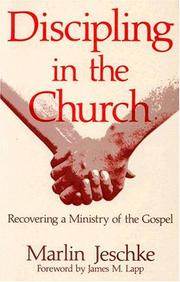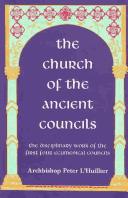| Listing 1 - 10 of 13 | << page >> |
Sort by
|

ISBN: 058522787X 9780585227870 083613480X Year: 1988 Publisher: Scottdale, Pa. Herald Press
Abstract | Keywords | Export | Availability | Bookmark
 Loading...
Loading...Choose an application
- Reference Manager
- EndNote
- RefWorks (Direct export to RefWorks)
Church discipline --- Religion --- Philosophy & Religion --- Christianity --- Discipline, Church --- Discipline, Ecclesiastical --- Ecclesiastical discipline --- Church polity --- Discipline --- Church discipline.
Book
ISBN: 2283601754 9782283601754 Year: 1998 Publisher: Paris: Lethielleux,
Abstract | Keywords | Export | Availability | Bookmark
 Loading...
Loading...Choose an application
- Reference Manager
- EndNote
- RefWorks (Direct export to RefWorks)
Indulgences --- Church discipline --- 248.158.1 --- Aflaten --- 248.158.1 Aflaten --- Jubilee indulgences --- Discipline, Church --- Discipline, Ecclesiastical --- Ecclesiastical discipline --- Church polity --- Discipline

ISBN: 3428079817 9783428079810 Year: 1994 Volume: 16 Publisher: Berlin: Duncker und Humblot,
Abstract | Keywords | Export | Availability | Bookmark
 Loading...
Loading...Choose an application
- Reference Manager
- EndNote
- RefWorks (Direct export to RefWorks)
Church discipline --- -Discipline --- -Church history --- -History --- Christianity --- Ecclesiastical history --- History, Church --- History, Ecclesiastical --- Ethics --- Church polity --- Discipline --- Discipline, Church --- Discipline, Ecclesiastical --- Ecclesiastical discipline --- History --- -Congresses --- Congresses --- Christian church history --- History of Europe --- anno 1500-1599 --- anno 1600-1699 --- Church discipline - History - Congresses. --- Church history - Modern period, 1500- - Congresses. --- Discipline - History - Congresses. --- Church history --- Reformation --- Eglise --- Réforme (Christianisme) --- Congresses. --- Histoire --- Congrès
Book
ISBN: 3525562497 9783525562499 Year: 1982 Volume: 43 Publisher: Göttingen: Vandenhoeck und Ruprecht,
Abstract | Keywords | Export | Availability | Bookmark
 Loading...
Loading...Choose an application
- Reference Manager
- EndNote
- RefWorks (Direct export to RefWorks)
Visitations, Ecclesiastical --- Church discipline --- Visitations, Ecclesiastical (Canon law) --- Protestant churches --- -Church discipline --- -#GROL:SEMI-284.1 --- Protestant sects --- Christian sects --- Protestantism --- Canon law --- Discipline, Church --- Discipline, Ecclesiastical --- Ecclesiastical discipline --- Church polity --- Discipline --- Ecclesiastical visitations --- Visits of state --- #GROL:SEMI-284.1 --- Visitations, Ecclesiastical - Germany (West) --- Protestant churches - Germany (West)
Multi
ISBN: 9171950974 Year: 1996 Publisher: Örebro Libris
Abstract | Keywords | Export | Availability | Bookmark
 Loading...
Loading...Choose an application
- Reference Manager
- EndNote
- RefWorks (Direct export to RefWorks)
316:2 <485> --- Godsdienstsociologie--Zweden --- Church discipline. --- Free churches --- Discipline. --- 316:2 <485> Godsdienstsociologie--Zweden --- Church discipline --- Believers' church --- Churches, Free --- Nonconformity (Religion) --- Christian sects --- Church and state --- Protestant churches --- Dissenters, Religious --- Established churches --- Discipline, Church --- Discipline, Ecclesiastical --- Ecclesiastical discipline --- Church polity --- Discipline --- Sweden --- Church history.
Book
ISBN: 9780511676192 9780521199322 9781107412538 9780511677038 0511677030 0521199328 1107205603 1282536036 9786612536038 0511678290 0511681526 0511683502 0511676190 0511679548 1107412536 9781107205604 9781282536036 6612536039 9780511678295 9780511681523 9780511683503 9780511679544 Year: 2010 Publisher: Cambridge, UK New York Cambridge University Press
Abstract | Keywords | Export | Availability | Bookmark
 Loading...
Loading...Choose an application
- Reference Manager
- EndNote
- RefWorks (Direct export to RefWorks)
The late medieval Church obliged all Christians to rebuke the sins of others, especially those who had power to discipline in Church and State: priests, confessors, bishops, judges, the Pope. This practice, in which the injured party had to confront the wrong-doer directly and privately, was known as fraternal correction. Edwin Craun examines how pastoral writing instructed Christians to make this corrective process effective by avoiding slander, insult, and hypocrisy. He explores how John Wyclif and his followers expanded this established practice to authorize their own polemics against mendicants and clerical wealth. Finally, he traces how major English reformist writing - Piers Plowman, Mum and the Sothsegger, and The Book of Margery Kempe - expanded the practice to justify their protests, to protect themselves from repressive elements in the late Ricardian and Lancastrian Church and State, and to urge their readers to mount effective protests against religious, social, and political abuses.
Admonition --- Church renewal --- Church discipline --- Christian literature, English (Middle) --- Discipline, Church --- Discipline, Ecclesiastical --- Ecclesiastical discipline --- Church polity --- Discipline --- Christianity --- Church --- Church reform --- Reform of the church --- Renewal of the church --- Religious awakening --- Warnings --- History --- History and criticism. --- Renewal --- Reform --- England --- Church history --- Arts and Humanities --- Literature
Book
ISBN: 9782204099158 2204099155 Year: 2012 Volume: 547 Publisher: Paris: Cerf,
Abstract | Keywords | Export | Availability | Bookmark
 Loading...
Loading...Choose an application
- Reference Manager
- EndNote
- RefWorks (Direct export to RefWorks)
"Participer de près ou de loin à un sacrifice aux dieux païens est une faute qui exclut de l'Église. Mais que faire lorsque des dizaines, des centaines de chrétiens ont commis cette faute? Sous l'empereur Dèce, en 250, on risquait la prison, l'exil, la confiscation des biens, la torture, la mort même, si l'on ne participait pas aux sacrifices publics exigés par l'empereur pour ressouder l'unité du monde romain. Beaucoup ont faibli, sont tombés, ce sont les lapsi. Des rigoristes n'envisageaient aucune réconciliation pour ces lapsi ; des laxistes accueillaient les fautifs sans vraie repentance, surtout s'ils étaient porteurs de billets d'indulgence signés par des martyrs avant leur mort ou par des confesseurs de la foi. Entre les deux, Cyprien refuse d'interdire l'espoir, mais exige qu'on prenne conscience de la gravité de la faute commise et qu'on pratique une authentique pénitence, dans les larmes, la prière, le jeûne, l'aumône. Exhorter les fautifs pour qu'ils se plient à ces exigences, c'est les aimer vraiment et leur ouvrir l'espérance"--Publisher description.
Patrology --- Church discipline --- Persecution --- Eglise --- Persécutions --- Early works to 1800. --- Early works to 1800 --- Discipline --- Ouvrages avant 1800 --- Cyprian, --- History --- Critical edition --- 233.2 --- 276 =71 CYPRIANUS, THASCIUS CAECILIUS --- #GGSB: Latijnse patrologie (tekst) --- Actuele zonde:--dogmatische aspecten --- Latijnse patrologie--CYPRIANUS, THASCIUS CAECILIUS --- 233.2 Actuele zonde:--dogmatische aspecten --- Critical edition. --- Persécutions --- Christians --- Religious persecution --- Atrocities --- Discipline, Church --- Discipline, Ecclesiastical --- Ecclesiastical discipline --- Church polity --- Persecutions --- Latijnse patrologie (tekst) --- Church discipline - Early works to 1800 --- Persecution - Rome --- Church discipline - History - Early church, ca 30-600 --- Cyprian, - Saint, Bishop of Carthage - De lapsis
Book
ISBN: 9781107022140 9781139135436 9781107417427 9781139526180 1139526189 1139135430 1107022142 1139540173 1139888927 1139532049 1139530852 1139528572 1283638231 113952738X 1107417422 Year: 2012 Publisher: New York Cambridge University Press
Abstract | Keywords | Export | Availability | Bookmark
 Loading...
Loading...Choose an application
- Reference Manager
- EndNote
- RefWorks (Direct export to RefWorks)
This book investigates how bishops deployed reward and punishment to control their administrative subordinates in thirteenth-century England. Bishops had few effective avenues available to them for disciplining their clerks and rarely pursued them, preferring to secure their service and loyalty through rewards. The chief reward was the benefice, often granted for life. Episcopal administrators' security of tenure in these benefices, however, made them free agents, allowing them to transfer from diocese to diocese or even leave administration altogether; they did not constitute a standing episcopal civil service. This tenuous bureaucratic relationship made the personal relationship between bishop and clerk more important. Ultimately, many bishops communicated in terms of friendship with their administrators, who responded with expressions of devotion. Michael Burger's study brings together ecclesiastical, social, legal and cultural history, producing the first synoptic study of thirteenth-century English diocesan administration in decades. His research provides an ecclesiastical counterpoint to numerous studies of bastard feudalism in secular contexts.
Benefices, Ecclesiastical --- Church polity. --- Church discipline. --- Bénéfices ecclésiastiques --- Eglise --- History --- Histoire --- Gouvernement --- Discipline --- England --- Angleterre --- Church history --- Histoire religieuse --- -Church polity. --- 27 <420> "10/14" --- Discipline, Church --- Discipline, Ecclesiastical --- Ecclesiastical discipline --- Church polity --- Church benefices --- Ecclesiastical benefices --- Expectative graces --- Graces, Expectative --- Pluralism (Benefices) --- Church property --- Clergy --- Christian sects --- Christianity --- Church government --- Ecclesiastical polity --- Polity, Ecclesiastical --- Church --- Polity (Religion) --- History. --- Kerkgeschiedenis--Engeland--?"10/14" --- Salaries, etc. --- Government --- Polity --- -Benefices, Ecclesiastical --- Bénéfices ecclésiastiques --- Anglii︠a︡ --- Inghilterra --- Engeland --- Inglaterra --- Anglija --- England and Wales --- -Church polity --- Church discipline --- Arts and Humanities --- -Arts and Humanities
Book
ISBN: 9780521515474 0521515475 Year: 2010 Publisher: Cambridge: Cambridge university press,
Abstract | Keywords | Export | Availability | Bookmark
 Loading...
Loading...Choose an application
- Reference Manager
- EndNote
- RefWorks (Direct export to RefWorks)
"Thascius Caecilius Cyprianus believed fervently that his conversion experience had been a passage from the darkness of the world of Graeco-Roman paganism to his new vision of Christianity. But Cyprian's response as bishop to the Decian persecution was to be informed by the pagan culture that he had rejected so completely. His view of church order also owed much to Roman jurisprudential principles of legitimate authority exercised within a sacred boundary spatially and geographically defined. Given the highly fragmented state of the non-Christian sources for this period, Cyprian is often the only really contemporary primary source for the events through which he lived. In this book, Allen Brent contributes to our understanding both of Roman history in the mid-third century and of the enduring model of church order that developed in that period"--Provided by publisher.
Church history --- Church discipline. --- Church polity. --- Eglise --- Histoire --- Discipline --- Gouvernement --- Cyprian, --- Carthage (Extinct city) --- Carthage (Ville ancienne) --- Church history. --- Histoire religieuse --- Religious thought --- Persecution --- History --- -Church discipline. --- 276 =71 CYPRIANUS, THASCIUS CAECILIUS --- Christian sects --- Christianity --- Church government --- Ecclesiastical polity --- Polity, Ecclesiastical --- Church --- Polity (Religion) --- Discipline, Church --- Discipline, Ecclesiastical --- Ecclesiastical discipline --- Church polity --- Ecclesiastical history --- History, Church --- History, Ecclesiastical --- Latijnse patrologie--CYPRIANUS, THASCIUS CAECILIUS --- Government --- Polity --- Caecilius Cyprianus, --- Cebrià, --- Cipriano, --- Cyprian, von Karthago, --- Cyprianus, --- Cyprianus, Thascius Caecilius, --- Cyprien, --- Tascio Cecilio Cipriano, --- Thascius Caecilius Cyprianus, --- Pseudo-Cyprian, --- -Carthage (Ancient city) --- Carthago (Extinct city) --- Kart Hadasht (Extinct city) --- Qarțājannah (Extinct city) --- Tunisia --- Antiquities --- -Church history. --- Church discipline --- Apostolic Church --- Church, Apostolic --- Early Christianity --- Early church --- Primitive and early church --- Primitive Christianity --- Fathers of the church --- Great Apostasy (Mormon doctrine) --- Carthage (Ancient city) --- Religious thought - To 600. --- Persecution - History - Early church, ca. 30-600. --- Cyprian, - Saint, Bishop of Carthage

ISBN: 0881410071 9780881410075 Year: 1996 Publisher: Crestwood ( NY): St Vladimir's seminary press,
Abstract | Keywords | Export | Availability | Bookmark
 Loading...
Loading...Choose an application
- Reference Manager
- EndNote
- RefWorks (Direct export to RefWorks)
Canon law --- Church discipline --- Councils and synods, Ecumenical. --- History. --- History --- 262.5*12 --- 262.5*13 --- 262.5*14 --- 262.5*15 --- -Canon law --- -Church discipline --- -Councils and synods, Ecumenical --- Ecumenical councils and synods --- Oecumenical councils and synods --- Discipline, Church --- Discipline, Ecclesiastical --- Ecclesiastical discipline --- Church polity --- Discipline --- Public law (Canon law) --- Law --- Ecclesiastical law --- Rescripts, Papal --- Nicea I--(325) --- Constantinopel I--(381) --- Ephese--(431) --- Chalcedon--(451) --- Sources --- -Catholic Church --- Council of Chalcedon, 451 --- Council of Constantinople, 1st, 381 --- Council of Ephesus, 431 --- Council of Nicaea, 1st, 325 --- -Council of Chalcedon, 451 --- 262.5*15 Chalcedon--(451) --- 262.5*14 Ephese--(431) --- 262.5*13 Constantinopel I--(381) --- 262.5*12 Nicea I--(325) --- Canon law - Sources. --- Canon law - History. --- Church discipline - History - Early church, ca. 30-600.
| Listing 1 - 10 of 13 | << page >> |
Sort by
|

 Search
Search Feedback
Feedback About UniCat
About UniCat  Help
Help News
News